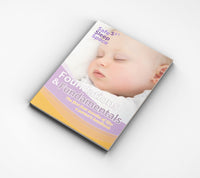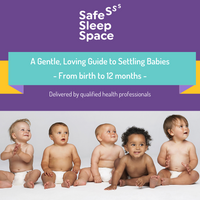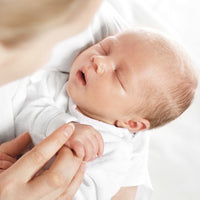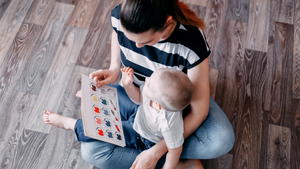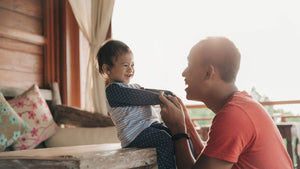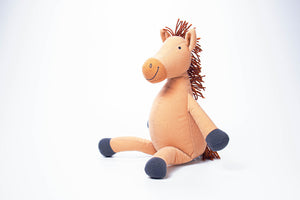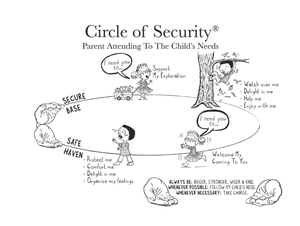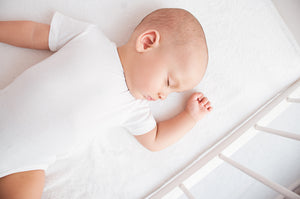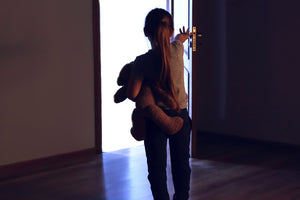Co-Sleeping: Is it Safe and Can I do It?

The advice from health professionals is that all babies should sleep in their own safe sleeping space e.g. a cot or a bassinet, whichever is safest.
Co-sleeping is not always safe and is not recommended, because it may increase the risk of sudden and unexplained death in infancy (SUDI).
The truth is though, that many parents at some stage choose to co-sleep with their baby. If so, there are some ways to make co-sleeping less risky.
General Recommendations for Safe Sleeping
- Always sleep your baby on their back.
- Keep their head and face uncovered.
- Keep your baby smoke free, before, and after birth.
- Follow the safe sleeping environment recommendations both day and night.
- Sleep your baby in your own room in their own safe cot.
- Breastfeed your baby if possible.
Reasons why Parents may Co-Sleep
Despite best intentions not to co-sleep, it can become very enticing for exhausted parents to just pop their baby into bed with them. Babies are biologically primed to want to be physically close to their parent/s and breastfeeding is easier when a baby and mother are in close proximity to each other. Many babies calm immediately when they lie next to their parent/s and are soothed by being up close.
Co-sleeping can be culturally normal for many families. For some parents, it doesn’t seem right to be separated from their babies, particularly at night.
Parents, whose parenting philosophy fits more towards the attachment style, claim that co-sleeping is a more natural way of doing things. Some people believe that co-sleeping helps to build an emotional connection between parents and their children.
Lack of a cot or alternative place for a baby to sleep. Financial constraints, the cot being used by an older child, lack of space - there are all sorts of reasons why a cot may not be an option for some families.
Parental anxiety can be another reason why parents choose to co-sleep. When a parent is experiencing anxiety or depression, they may feel an escalation in their symptoms if their baby isn’t physically close.
Risks of Co-Sleeping
- It increases the risk of SUDI – Sudden Unexplained Death in Infancy.
- There is an increased risk of sleeping accidents e.g. baby rolling off the bed or the parent rolling onto the baby.
- Babies can become dependent on co-sleeping and often, aren’t keen for it to end.
- Babies often protest, loudly, when co-sleeping stops.
- Some babies are very restless when they sleep, causing their parent/s sleep to be disturbed. Many parents report that although their baby sleeps better lying beside them in the same bed, the parent doesn’t have the same quality of sleep they would otherwise do.
- Co-sleeping can affect parental relationships. Having a small person (or two) in the bed can impact on intimate parental relationships.
- Breastfed babies can become very used to ‘comfort feeding’ every time they rouse. They learn to associate sucking on the breast to resettle and protest when they can’t.
- Stopping co-sleeping can take more energy than continuing.
- Although co-sleeping may be considered a short term solution to all sorts of sleep disruptions, most babies quickly learn it’s their preferred sleeping arrangement.
- When a new baby is coming into the family, parents can become apprehensive about transitioning the older child into their cot/bed.
Safer Ways to Co-Sleep
- Always place your baby on their back to sleep, never on their tummy (prone) or their side.
- Make sure the bed mattress is clean and firm. Gaps around the edge of the mattress and a wall or bed frame can lead to the baby become wedged.
- Move the bed away from the wall, which will reduce the risk of the baby getting trapped.
- Keep all pillows, sheets, blankets and doonas away from the baby, especially their face.
- Use a safe sleeping bag to keep your baby warm. Make sure it has a fitted neck, fitted armholes and no hood and always make sure your baby’s arms are out.
- If you or your partner has long hair, tie it up.
- Remove any teething necklaces or jewellery from your baby.
- Never co-sleep if you’re extremely tired.
- Make sure your baby can’t roll or fall out of the bed. Place the mattress on the floor to reduce the risk of injuries from baby falling onto the floor.
- Position your baby so they’re lying to the side of one parent, not between two adults.
- Don’t allow pets or other children on the bed at the same time as the baby is sleeping.
- Never co-sleep on a sofa, couch, in a bean bag or in an armchair.
Weighing the Risks and Benefits of Co-Sleeping
Common Parental Concerns
- I feel closer to my baby when I co-sleep.
Many parents say that co-sleeping with their baby and snuggling close to them is a loving and affectionate thing to do. Affection and cuddling is always encouraged, but it’s safer to do this during wake times.
- My baby will calm, sleep better and keep warm if they co-sleep.
Some parents say their baby sleeps better when they share the same bed. But it’s important to know that there is an increased risk of death for a young baby who co-sleeps because of the potential for overheating and the baby’s head being covered.
- My Baby is sick and needs to be close to me
When a baby is sick, it can be reassuring having them close. However, illness can cause an increase in body temperature. Co-sleeping can lead to overheating which is a major risk factor for SUDI.
- Co-sleeping with my baby is easier than settling them in their cot
Co-sleeping can be a ‘quick-fix’ in the middle of the night when all other settling options haven’t worked. However, helping your baby settle in their own safe sleep space will help them to learn how to settle independently. Making changes can be hard for parents and their babies, the best way to do this is in a gentle and responsive way. It can help to seek support from a qualified health professional to learn what is safe and right for you and your baby.
Five Important Things to Know About Co-Sleeping
- Tell your healthcare professional if you are co-sleeping with your baby. Being upfront will mean they can give you individual advice about what’s right for you and your baby.
- It’s unlikely your baby will be the one who wants to bring an end to co-sleeping. Initiating and sustaining the change will need to come from you.
- Co-sleeping is risky. Evidence is clear that the safest place for all babies to sleep is in their own safe cot or bassinet.
- Your baby’s mental health is not conditional upon where they sleep. Play, feeding, genetics and interaction all impact on a baby’s psychological development. Sleep is not separate from all the other (positive) influences in a baby’s life.
- Speak with your partner about being consistent when it comes to your baby’s cares.
Other blog posts you will find helpful:
When is it time to get help for my child's sleeping?
Why is infant mental health so important when it comes to sleep?
Amber beads. Why they're really not a good idea.
Why is my baby noisy when they sleep?
Help with looking after your baby
The NourishBaby - Guide to Babies - is an online program that you can view in your own time. The Guide to Babies helps you to understand and care for your baby and covers key milestones, sleep and settling advice and baby development. There is a section on real parents sharing their experience of adjusting to parenthood.
Many parents have reduced sleep when a new baby arrives. The Safe Sleep Space website has a variety of resources and supports to provide tips and advice on how to assist your baby with sleep. You can also book a phone consultation to speak with a Sleep Consultant.
References
- https://www.breastfeeding.asn.au/bfinfo/breastfeeding-and-co-sleeping
- https://rednose.org.au/article/mother-infant-bed-sharing-in-clinical-settings
- https://www.ternitygroup.com.au
Written for Nourish by Jane Barry, Child Health Nurse and Midwife.
- Tags: baby baby sleep Sleep
